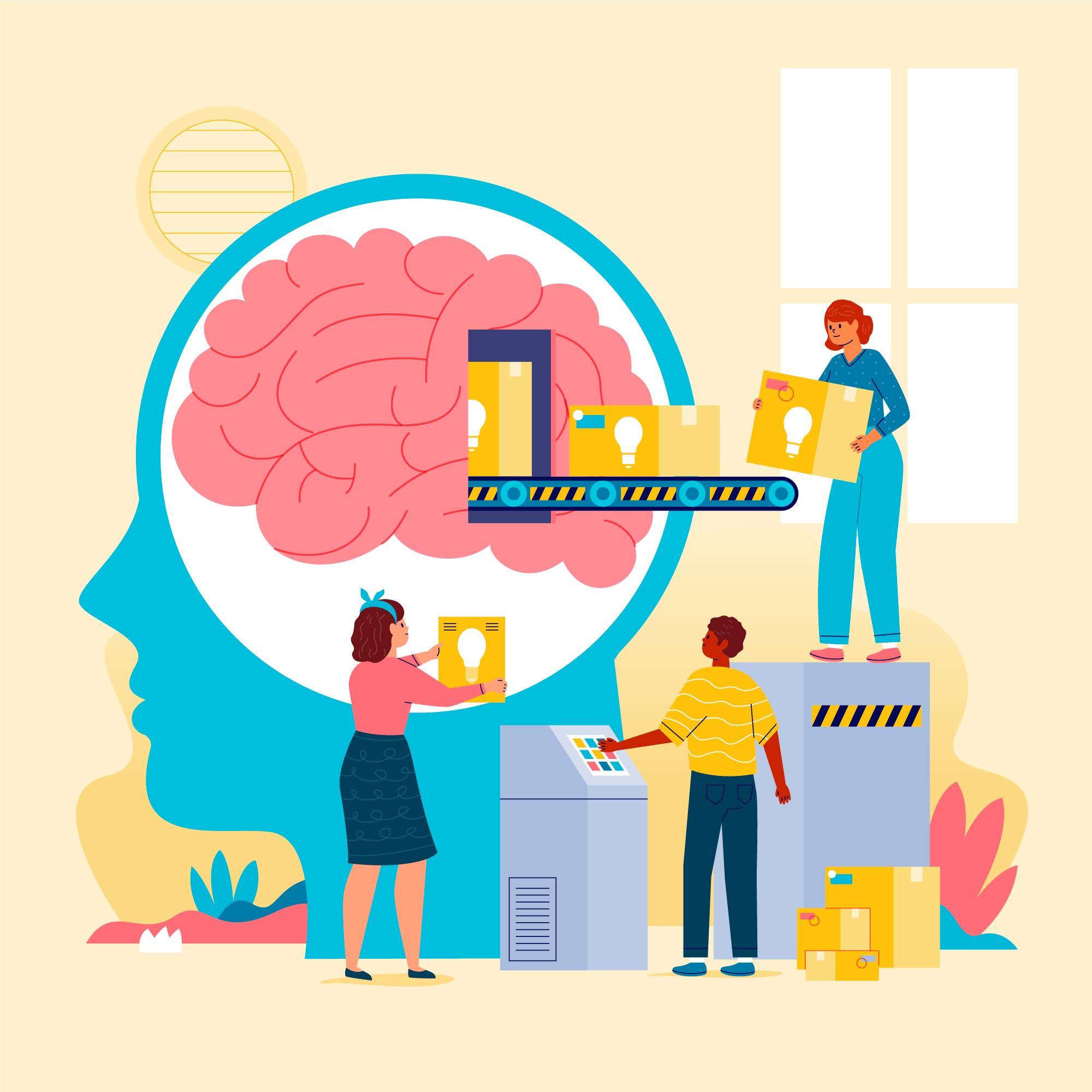The ability of the brain to sustain normal cognitive function despite age-related changes or brain disease is referred to as cognitive reserve. It protects against cognitive decline and may contribute to improved brain health and resilience.
Here’s how cognitive reserve and brain health are interconnected:
Definition of Cognitive Reserve: Cognitive reserve is defined as the brain’s ability to endure age-related changes or disease while retaining cognitive function. It entails making the most use of existing brain networks and adapting to new difficulties.
#Cognitive Reserve and Brain Health
Variables Influencing Cognitive Reserve: Education, occupational complexity, social involvement, and participation in cognitively challenging activities are all variables that influence cognitive reserve. Engaging in cognitively engaging activities throughout one’s life is linked to greater cognitive reserve.
Education and Occupational Complexity: Higher levels of schooling and participation in cognitively taxing employment are associated with increased cognitive reserve. These events are thought to strengthen brain connections and promote cognitive flexibility.
Social Interactions and Engagement with a Variable Social Network: Social interactions and engagement with a varied social network contribute to cognitive reserve. Because of the intricacy of social interactions and the cognitive challenges they involve, socially engaged people may gain cognitive.
#Cognitive Reserve and Brain Health
Mental Stimulation: Regular engagement in cognitively engaging activities such as reading, puzzles, and acquiring new skills has been linked to higher cognitive reserve. These exercises test the brain and encourage the development of neural networks.
Brain Plasticity: Cognitive reserve is strongly tied to the idea of brain plasticity, which refers to the brain’s ability to rearrange and change in response to new experiences. Participating in activities that induce brain plasticity helps to maintain cognitive reserve.
Protective Effect Against Cognitive Decline: Even in the context of brain illness, individuals with higher cognitive reserve may suffer a delayed onset of cognitive decline or dementia. The brain’s capacity to adjust for neuronal injury or loss is an important feature of cognitive reserve.
#Cognitive Reserve and Brain Health
Resilience to Brain Damage: It is considered that cognitive reserve confers resilience in the face of brain damage or neurological illnesses. Individuals with more cognitive reserve may experience fewer cognitive symptoms after a brain injury or illness.
Lifestyle Factors: Healthy lifestyle choices such as frequent physical activity, a balanced diet, and appropriate sleep all contribute to general brain health and may improve cognitive reserve.
Cognitive Training: Participating in cognitive training programs that focus on certain cognitive processes, such as memory or attention, may help to create cognitive reserve.
#Cognitive Reserve and Brain Health
Continued Learning: Lifelong learning, pursuit of new interests, and acquisition of new abilities all contribute to cognitive reserve. Learning new material and adjusting to new problems can improve cognitive performance.
Clinical Implications: Understanding cognitive reserve has practical consequences, including the creation of therapies to improve cognitive reserve and techniques for cognitive rehabilitation in people with cognitive problems.
To summarize, cognitive reserve refers to the brain’s ability to adapt and retain cognitive function in the face of age-related changes or disease. Education, cognitively engaging activities, social contacts, and a healthy lifestyle are all important factors in building cognitive reserve and general brain health.

Dive into the concept of cognitive reserve and Brain Health
Yes, let’s delve more into the notion of cognitive reserve and its relevance to brain health.
#Cognitive Reserve and Brain Health
Factors Influencing Cognitive Reserve:
Education: Higher levels of schooling are frequently associated with a stronger cognitive reserve. Education is supposed to aid in the formation of neural connections and the effective usage of existing brain networks.
Occupational Complexity: Working in cognitively taxing jobs, particularly those requiring problem-solving and critical thinking, is associated with more cognitive reserve. Occupations with higher cognitive demands may help to build a more robust brain.
Lifelong Learning: Engaging in learning activities, exploring new interests, and gaining new abilities throughout one’s life all contribute to cognitive reserve. This continuous mental stimulation benefits brain health.
#Cognitive Reserve and Brain Health
Social Engagement: A robust social network and social interactions are linked to cognitive reserve. Meaningful social contact includes complicated cognitive processes and may help the brain adapt.
Mental Stimulation: Participating in cognitively stimulating activities such as reading, puzzles, and learning new languages on a regular basis promotes cognitive reserve. These activities put the brain to the test, stimulating the development of neural networks.
Healthy Lifestyle: A healthy lifestyle includes factors such as frequent physical activity, a balanced diet, and appropriate sleep. These lifestyle changes are associated with improved cognitive performance and may increase cognitive reserve.
#Cognitive Reserve and Brain Health
Relationship with Brain Health:
Delaying Cognitive Decline: People with stronger cognitive reserves may have a slower start to cognitive decline. Even in the presence of brain disease, the brain’s ability to adjust for damage permits cognitive function to be preserved.
Resilience to Brain Damage: It is considered that cognitive reserve confers resilience in the face of brain damage or neurological illnesses. It might explain why some people have fewer cognitive symptoms after brain damage or illness.
Brain Plasticity: Cognitive reserve is strongly related to the notion of brain plasticity, which refers to the brain’s ability to restructure and adapt. Activities that encourage brain plasticity help to increase cognitive reserve by encouraging the formation of new neural connections.
#Cognitive Reserve and Brain Health
Clinical consequences: Understanding cognitive reserve has clinical consequences. It implies that cognitive reserve-enhancing treatments, such as cognitive training programs or educational efforts, might be effective in boosting brain health and resilience.
In summary, cognitive reserve highlights the significance of preserving optimal brain function and resistance against cognitive decline through lifestyle, education, and continual mental engagement. It emphasizes the concept that maintaining a proactive approach to cognitive health throughout life might lead to a more robust and adaptable brain.
Activities and lifestyle choices that may contribute to cognitive reserve
Building cognitive reserve entails developing habits and engaging in activities that protect and promote cognitive function. Here are several activities and lifestyle decisions that contribute to cognitive reserve:
#Cognitive Reserve and Brain Health
Education and Lifelong Learning: Keep your brain challenged by pursuing education, learning new skills, or engaging in intellectually demanding activities.
Physical Exercise: Regular exercise, particularly aerobic exercises, increases blood flow to the brain, encourages the creation of new neurons, and boosts general cognitive health.
Social Engagement: Maintaining relationships, participating in group activities, and engaging in meaningful conversations are all ways to stay socially engaged. Cognitive function is stimulated by social connections.
Mental stimulation: Engage in brain-challenging activities such as puzzle solving, strategic gaming, or learning a new instrument. These exercises aid in the development and maintenance of cognitive reserves.
#Cognitive Reserve and Brain Health
Healthy Diet: Consume a well-balanced diet high in antioxidants, omega-3 fatty acids, and other nutrients that promote brain function. Fruits, vegetables, seafood, and nuts can all be healthy.
Adequate Sleep: Make quality sleep a priority because it is essential for memory consolidation and general cognitive performance. Sleep for 7-9 hours every night.
Stress Reduction: Try stress-reduction strategies like meditation, mindfulness, or yoga. Chronic stress can impair cognitive performance, and stress management is critical for cognitive reserve.
Cognitive Training: Take part in activities that are expressly meant to improve cognitive skills, such as memory training, attention drills, and problem-solving tasks.
Mindfulness and Meditation: Mindfulness and meditation can increase focus, attention, and overall cognitive performance while also decreasing stress.
#Cognitive Reserve and Brain Health
Brain-Healthy Lifestyle Choices: Avoid smoking and restrict alcohol use as brain-healthy lifestyle choices. Both smoking and heavy alcohol use can impair cognitive performance.
Regular Health Checkups: Diabetes, hypertension, and high cholesterol are all illnesses that might impair cognitive performance.
Maintain a Positive Attitude: Keeping a positive attitude and view of life might help with cognitive resilience. Positive emotions have been associated with improved cognitive health.
Remember that the goal is to live a balanced and healthy lifestyle that includes physical, mental, and social well-being.

